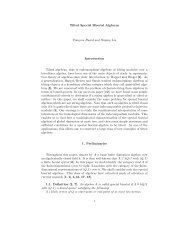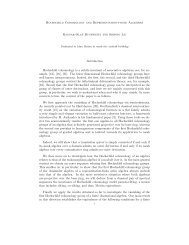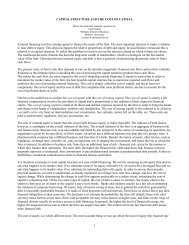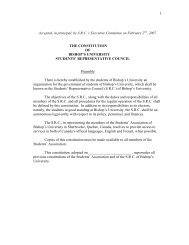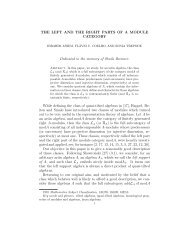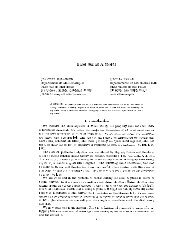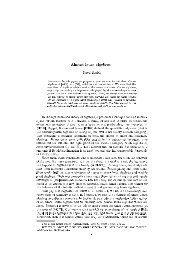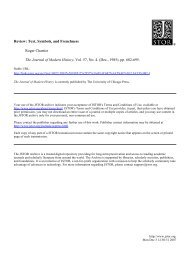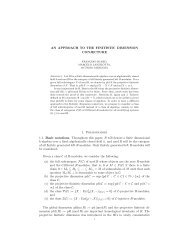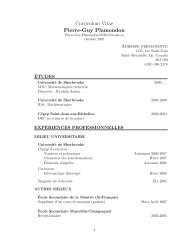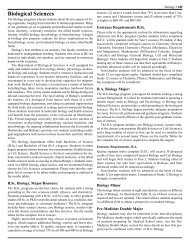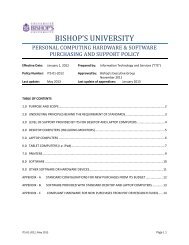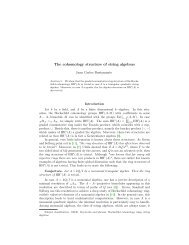Winter 2010 - Bishop's University
Winter 2010 - Bishop's University
Winter 2010 - Bishop's University
You also want an ePaper? Increase the reach of your titles
YUMPU automatically turns print PDFs into web optimized ePapers that Google loves.
journalism<br />
Alix at the shrine of the caliph Ali in Mazar-e Sharif, northern Afghanistan<br />
in March 2009 during the celebration of Nowruz, the Persian new year.<br />
ALIX KROEGER ’90<br />
Now working with the BBC TV News,<br />
Alix got her start in journalism<br />
almost by mistake. She went looking<br />
for the radio station at Bishop’s and instead<br />
happened upon The Campus newspaper<br />
office. She spent a good part of the next<br />
four years in that office, becoming Editor in<br />
her third year.<br />
By a quirk of fate (her mother was born in<br />
the UK), Alix was eligible for what the British<br />
call Right of Abode. After graduation she<br />
moved to Oxford and began working first at<br />
a small group of free newspapers, then at<br />
BBC Radio Oxford. In 1991, Alix got a job as<br />
a researcher with another BBC local radio<br />
station, and that was it – she stayed.<br />
“I lost my Canadian accent early on, an<br />
extension of adapting to post-university life.<br />
There’s no question it’s made it easier for me<br />
to get on air with the BBC. The British don’t<br />
particularly like North American accents<br />
or indeed any kind of import which makes<br />
them feel as though they’re being overrun<br />
and reduced to insignificance.<br />
Thus, the American grey squirrel that<br />
has largely wiped out the native British<br />
red squirrel is no mere rodent, but a living,<br />
breathing, tulip-bulb eating metaphor of<br />
cultural decline. Ditto blazing yellow fields<br />
of canola (oilseed rape), the indignity of<br />
whose appearance is compounded by the<br />
fact that the crop attracts generous<br />
8 BISHOP'S UNIVERSITY NEWS WINTER <strong>2010</strong><br />
subsidies from the European Union, which<br />
many Brits despise.”<br />
Going to Bosnia as a freelance foreign<br />
correspondent in 2000 has been Alix’s<br />
best professional experience. Bosnia had<br />
stopped being a crisis zone but was still<br />
figuring out how to be a country, with a lot<br />
of input from the international community.<br />
“I travelled around the country, watching<br />
landmines being cleared and refugees<br />
returning to the areas they’d been forced<br />
to leave. I also witnessed corruption and<br />
ethnically motivated violence. By the time I<br />
left in 2002, I was burnt out; it was a very<br />
intense time and place.”<br />
“Nothing is wasted,” declares Alix. From<br />
2002-05, she learned to speak German.<br />
As well as using it to report from Germany<br />
and Austria, the language helped her to<br />
interview a Romanian ethno-botanist in the<br />
Carpathian mountains; to get directions<br />
while lost in the Tajik capital, Dushanbe;<br />
and, while working on the launch of BBC<br />
Persian TV, to get through to a disaffected<br />
Iranian trainee.<br />
The Latin she studied at Bishop’s and<br />
in high school helped greatly when she<br />
was learning Bosnian/Croatian/Serbian in<br />
Sarajevo.<br />
For Alix, being a journalist is an<br />
enormous privilege. “Imagine getting<br />
paid to find out what is interesting and<br />
ask people questions about it.”<br />
From the field...<br />
“I was in Mazar-e Sharif to<br />
produce part of the BBC’s special<br />
coverage of Nowruz. For our outside<br />
broadcast, we settled on the rooftop<br />
of a hotel overlooking the shrine of<br />
Ali, a spot we soon shared with the<br />
Afghan police, army and national<br />
intelligence service. While we set up<br />
our satellite phone, they put in place<br />
a light machine gun.<br />
For the official ceremony, I was<br />
in the journalists’ enclosure in the<br />
centre of the shrine – an area that<br />
would normally have been off-limits<br />
to me as a non-Muslim. About<br />
a dozen turbaned mullahs and<br />
as many police officers stood in<br />
another nearby enclosure, a kind of<br />
glorified cage with an open top.<br />
Once the ceremonies were<br />
over, the barriers were lifted and<br />
hundreds of people hurtled towards<br />
this cage. Piling six, seven, a<br />
dozen deep, they threw scarves<br />
into the cage for blessing by the<br />
mullahs. When the supplicants got<br />
too numerous, the police officers<br />
would beat them back with their<br />
truncheons. Undeterred, the next<br />
wave would surge forward.<br />
Later my six (Afghan, male)<br />
colleagues and I went for a picnic.<br />
I bought a bottle of Uzbek vodka<br />
from an Indian restaurant (only<br />
foreigners can legally buy alcohol in<br />
Afghanistan) to accompany a trayful<br />
of kebabs, a giant thermos of tea<br />
and a bag of oranges.<br />
We finished the day at the first<br />
buzkashi match of the season.<br />
Buzkashi is the rather wild Afghan<br />
precursor to polo, played with the<br />
body of a headless calf, filled with<br />
sand. There are no teams: it’s every<br />
man for himself and, in this case,<br />
there were about 400 of them, all<br />
competing to see who could scoop<br />
up the calf and complete a circuit of<br />
the course. The next day I learned<br />
Afghan women are not allowed at<br />
”<br />
buzkashi matches.



